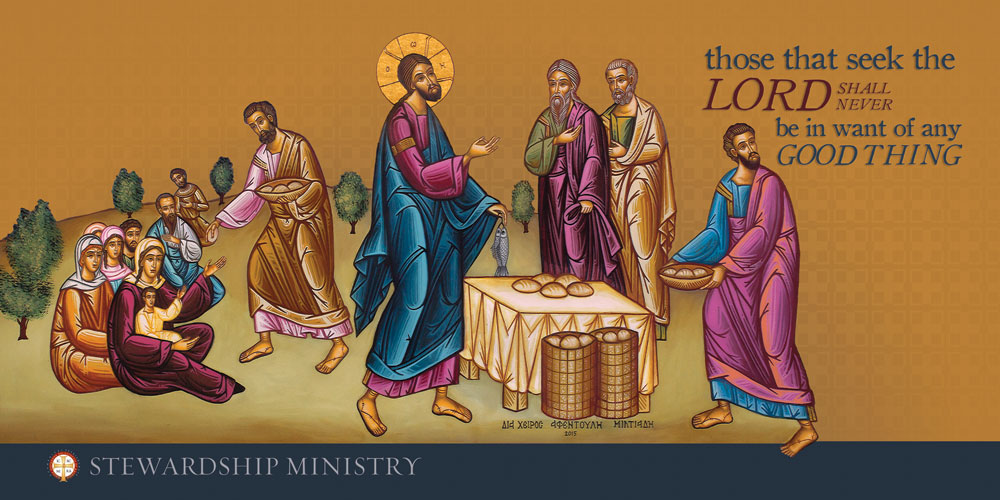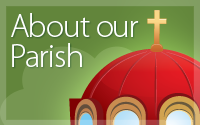
STEWARDSHIP: A New Perspective
It was Sunday and the parish council members were counting the Sunday offering in the church office as the trays were being brought in from Divine Liturgy. One faithful parishioner found his way back to the church office and politely inquired, “How much do I owe?”
This well-intentioned parishioner was asking if he was up-to-date on his pledge, but his question reveals something about our thought process in offering our gifts to the Church.
No matter how generously we support the Church, can we ever feel that we have given in proportion to the blessings we have received?
Many Greek Orthodox parishes have embraced the process of stewardship, by which we offer our gifts to the church according to our blessings. Many continue to operate in a dues system. And some operate under a hybrid Stewardship-with-a-minimum system.
IMPLICATIONS OF A DUES SYSTEM
The idea that as a parish we are able to set an amount that is fair for all the faithful, the payment of which makes them members in good standing with rights and privileges, is flawed for a number of reasons.
Is it fair to think that the elderly widow living on Social Security, the successful real estate developer, the banker, the young tradesman with a growing family, the teacher and the lawyer each have received the same material blessings and have the same ability to give?
To set a specific required dues amount places an undue burden on some, but most often it underestimates the individual’s ability to support the church.
JUST ANOTHER BILL
The dues system also diminishes the joy of giving and turns it into just another bill to be paid. It’s important to give with joy from our heart. As St. Paul writes to the Corinthians, “So let each one give as he intends in his heart, not grudgingly or of necessity; for God loves a cheerful giver” (2 Corinthians 9:7).
Gregory the Theologian writes, “You will never overcome God’s generosity, even if you give away all that you have…. And however much you bring to him, always more remains. Nor will you give anything that is your own; for all things flow from God (Or 14.22).”
RIGHTS AND ENTITLEMENTS
We often hear economists talk about the balance of payments. This concept also applies to our offering to the Church. We can never give enough to God for the blessings He has given us. We are always in a deficit position. But when we set a dues amount, whatever it may be, it implies that if we pay this amount, then we have fulfilled our obligation to the Church. “I paid my dues, now I get to vote, receive sacraments, and express my opinion on how the parish should be run.”
STEWARDSHIP WITH A MINIMUM
Many parishes attempt a sort of hybrid system of Stewardship with a minimum. This sends the contradictory message to parishioners that we trust you to give as you have been blessed, but are not willing to take that leap of faith. When we deal with minimums, we also have to realize that there is always a number of faithful who will be excluded when we have minimums and dues.
We need to be reminded that God never gives to us in minimums and our giving should never be guided by a minimum. Orthodox Christianity is not about minimums, it is about maximums. Jesus gave the maximum for us. We now carry on His ministry with maximum giving. And from a practical point of view, minimums have a funny way of becoming maximums.
STEWARDSHIP
Stewardship is our response to God’s grace and moves us from grace to gratitude. Just as we love because God first loved us (I John 4:14), we give because God first gave to us. The question of the Psalmist “What shall I give to the Lord in return for all His benefits towards me?” (Ps 116:2), is answered in every liturgy when the celebrant calls us to “offer ourselves and one another and our whole life to Christ our God.”
One January day, nearly 20 years ago, a young parish council president was just getting accustomed to his new duties when someone placed a stack of checks in front of him to be signed. As he quickly signed each check, his pen was suddenly stopped by the sight of a check that had been placed before him for his signature. It was the salary check for his priest – the priest who had baptized him, for whom he served as an altar boy, to whom he had gone for confession and whom he loved and respected as his spiritual father.
It was one of the most humbling experiences of his life. And the amount of the check seemed ridiculously small in consideration of the effect that this priest had on the lives his parishioners.
This is the same feeling we should have when we make our stewardship offering to the Lord – humility, appreciation, thanksgiving, joy, respect, and love.
THE EARLY CHURCH
In his book on the Eucharist, Fr Alexander Schmemann explains that in the early church, the Eucharistic sacrifice was offered by all the members of the church.
Each person coming to the gathering of the Church brought with them everything they could spare for the needs of the Church. This meant for the sustenance of the clergy, widows and orphans, for helping the poor, and for all the good works of the Church. This is the Church that we as Orthodox Christians claim to be.
STEWARDSHIP: A WAY OF LIFE
Stewardship is not about calculations or portions or percentages. It can’t be reduced to a number of hours of service or dollars offered. Stewardship is a way of life.
As Orthodox Christians, we are called to a new way of seeing things – a new way of life. Our stewardship is obedience to the greatest commandment to “love the Lord with all your heart, soul, mind and strength.” We are called to bring others to commit their lives to Jesus Christ in such a way that leads to the joy of knowing Him personally and profoundly.
As Orthodox Christians, we see the world as God’s gift, as a sacrament of God’s presence and a means of communion with Him. And so we are able to offer the world back to God in thanksgiving as we say in every Divine Liturgy “Thine own of Thine own we offer to thee…”

 View our online weekly parish bulletin
View our online weekly parish bulletin Shop the Orthodox Marketplace
Shop the Orthodox Marketplace